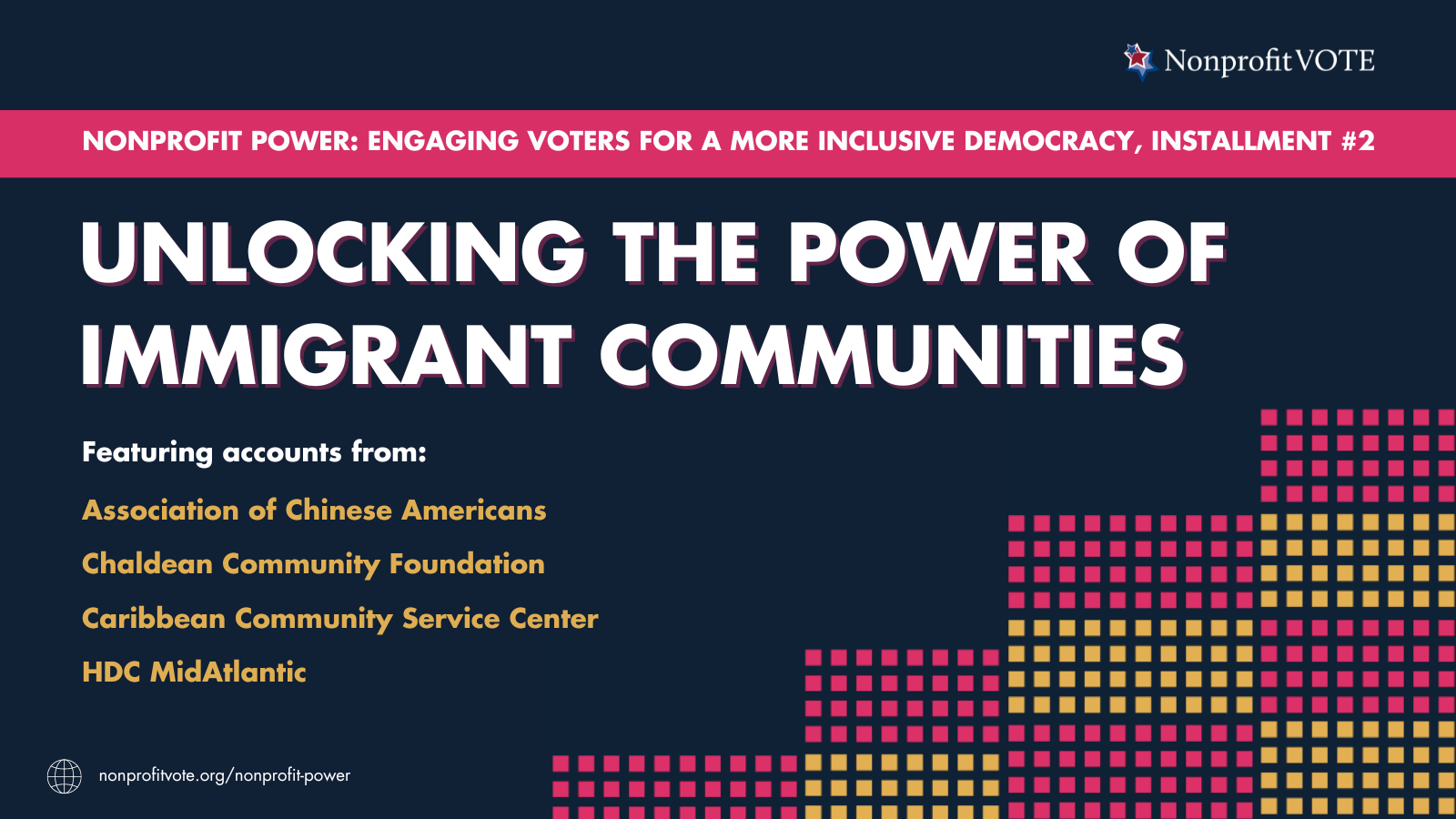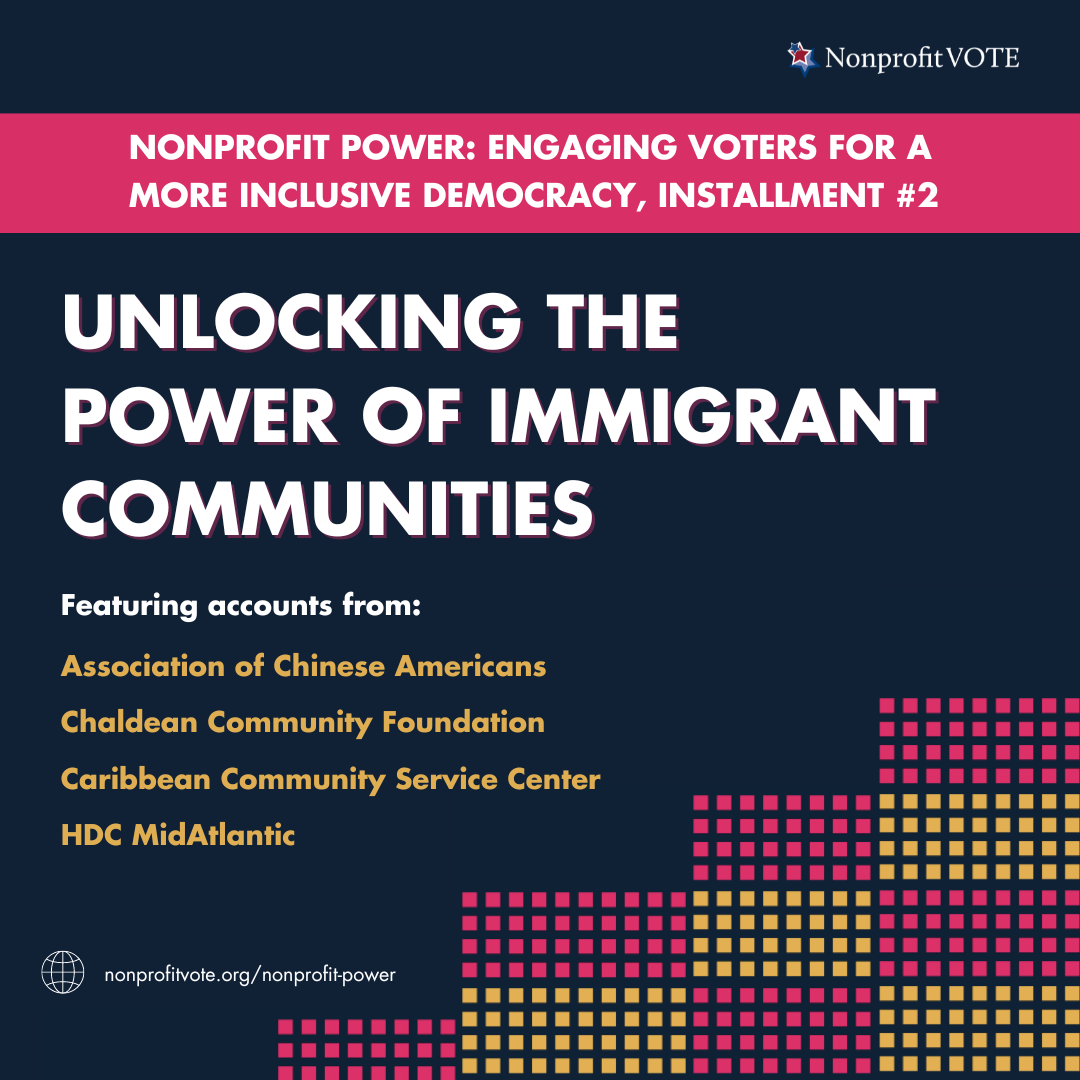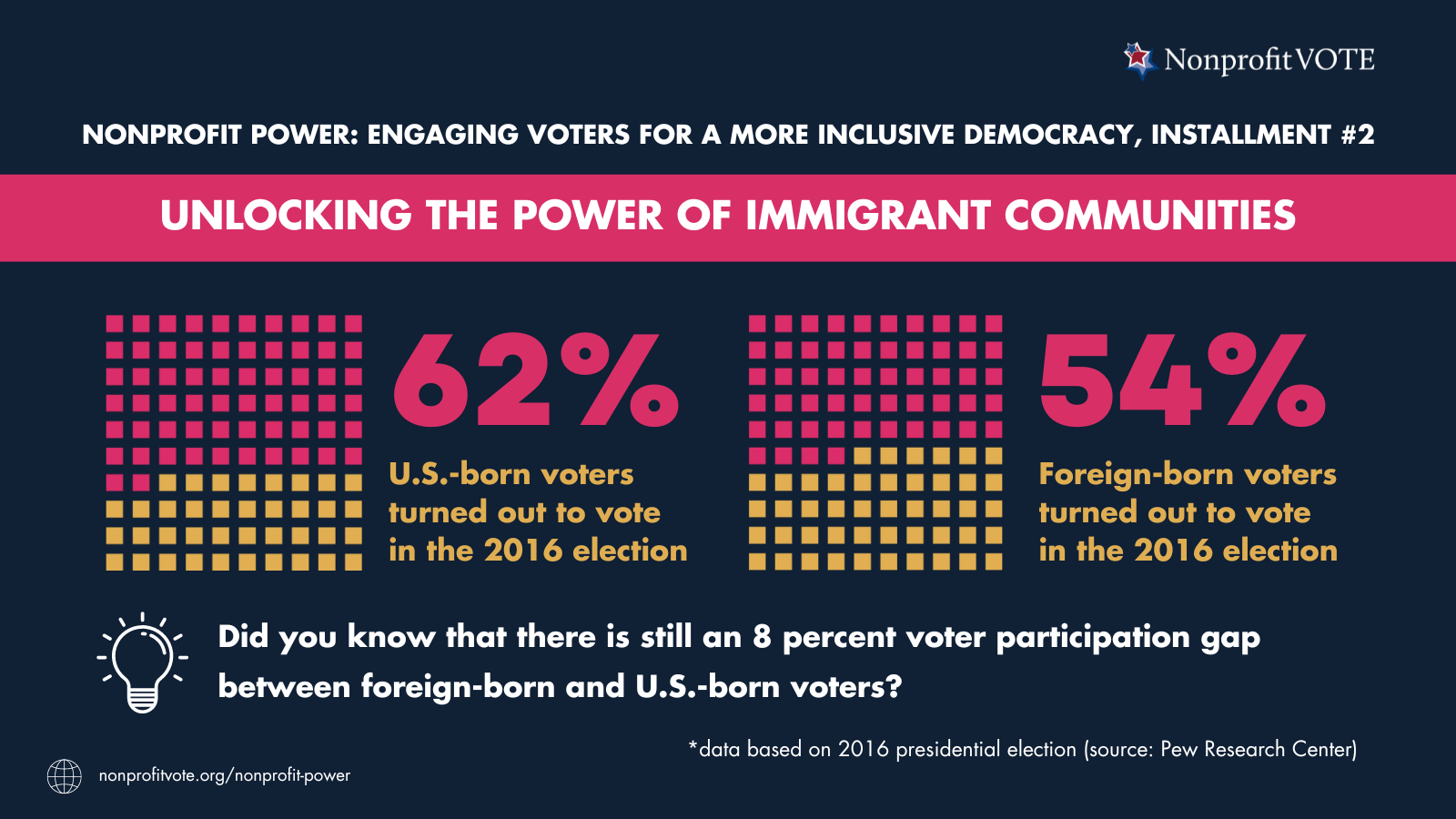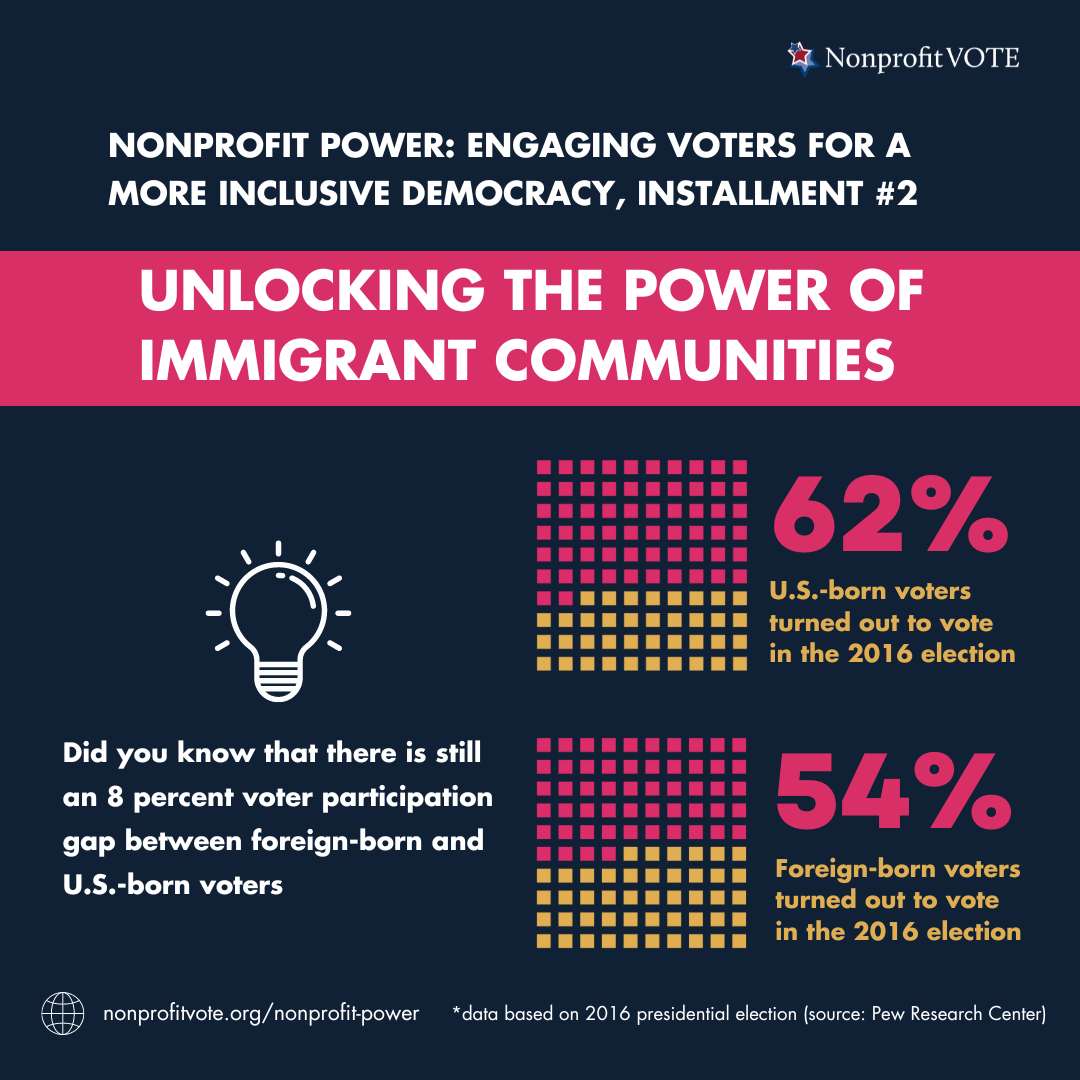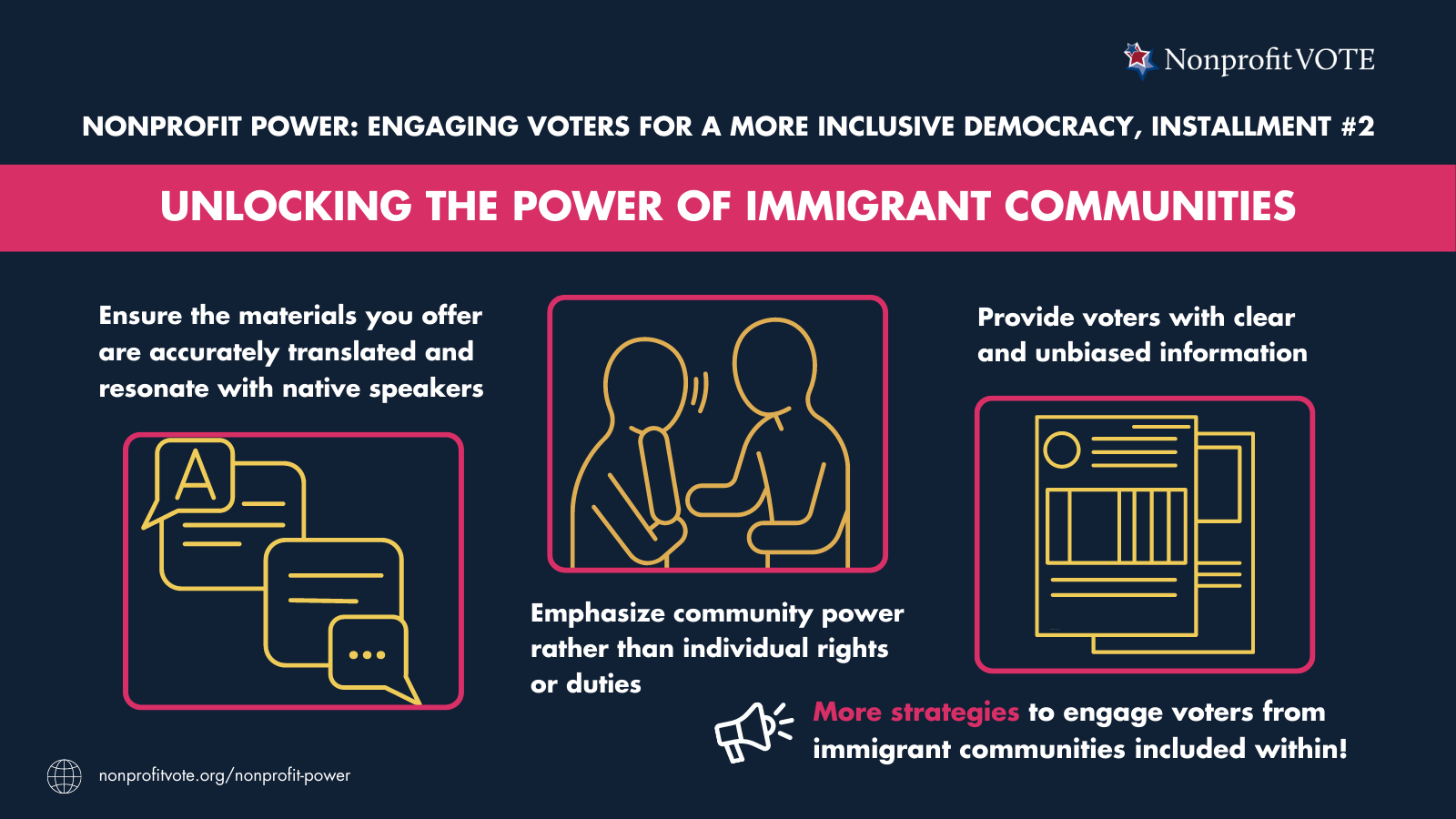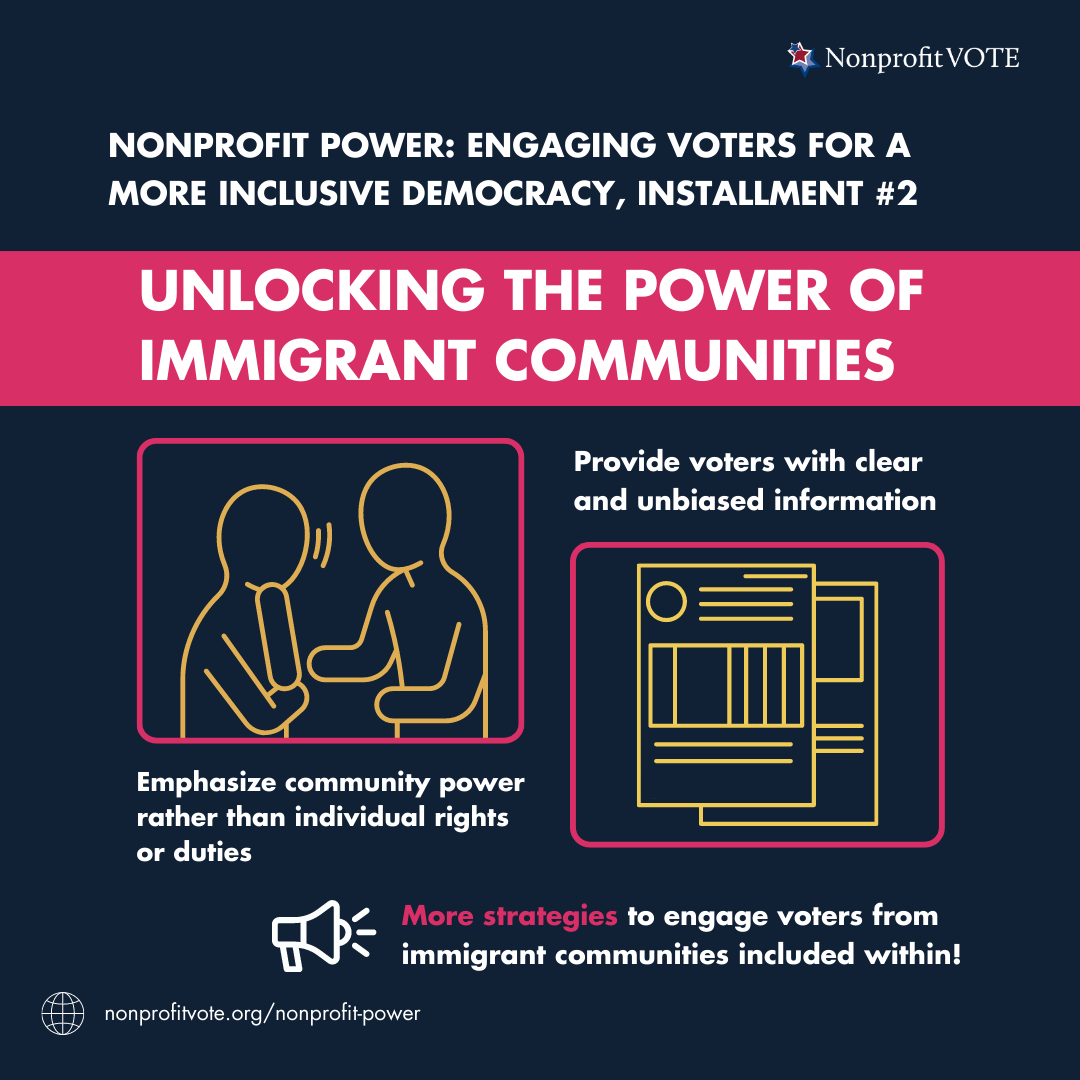
62% OF U.S.-BORN VOTERS TURNED OUT IN THE 2016 ELECTION

54% OF FOREIGN-BORN VOTERS TURNED OUT IN THE 2016 ELECTION
Thriving communities of first- and second- generation immigrants exist across the country, building robust networks of mutual support and honoring their shared cultures. Although some of these residents may be ineligible to vote, their American-born and/or naturalized family members do indeed have the right. Yet, voter participation gaps suggest voters from immigrant communities are turning out to vote at rates lower than their non-immigrant counterparts.

According to data from the Pew Research Center, there are nearly 45 million foreign-born (or first-generation) immigrants in the United States. Of this group, nearly half are naturalized citizens, and another 27% are lawful permanent residents who may pursue citizenship through naturalization after meeting certain requirements.
Voter eligibility of immigrants in the United States grew from 12% in 2000 to 23% in 2020. One in ten eligible voters today is an immigrant, and their U.S.-born children and families make these communities an even bigger segment of the electorate. As these communities grow, so should their representation, but many barriers prevent these voters from participating fully in our democracy.
*data based on 2016 presidential election (source: Pew Research Center)

62% OF U.S.-BORN VOTERS TURNED OUT IN THE 2016 ELECTION

54% OF FOREIGN-BORN VOTERS TURNED OUT IN THE 2016 ELECTION
Nonprofits have an important opportunity to improve voter turnout among immigrant communities they serve. Relying on trust, respect, and shared languages and beliefs, staff at organizations can change attitudes about voting and help these communities see the importance and benefits of voting. We asked several organizations that serve immigrant communities about the voting barriers those they serve face and how their organization has overcome them.
We spoke with four organizations that serve local immigrant populations, including Caribbean, Chaldean, and Chinese communities in Michigan, and Hispanic communities in Pennsylvania. The insights and suggestions in this report may not apply to every community, nor will they address the differences that often exist between first- and second- generation immigrants. However, for organizations looking to engage voters from immigrant communities, these barriers and strategies serve as a starting point.

“If we don’t register to vote, who is going to represent the Asian Americans’ best interest? We need to get our voices out and we need to let people hear us.”
—Peggy Du, Association of Chinese Americans
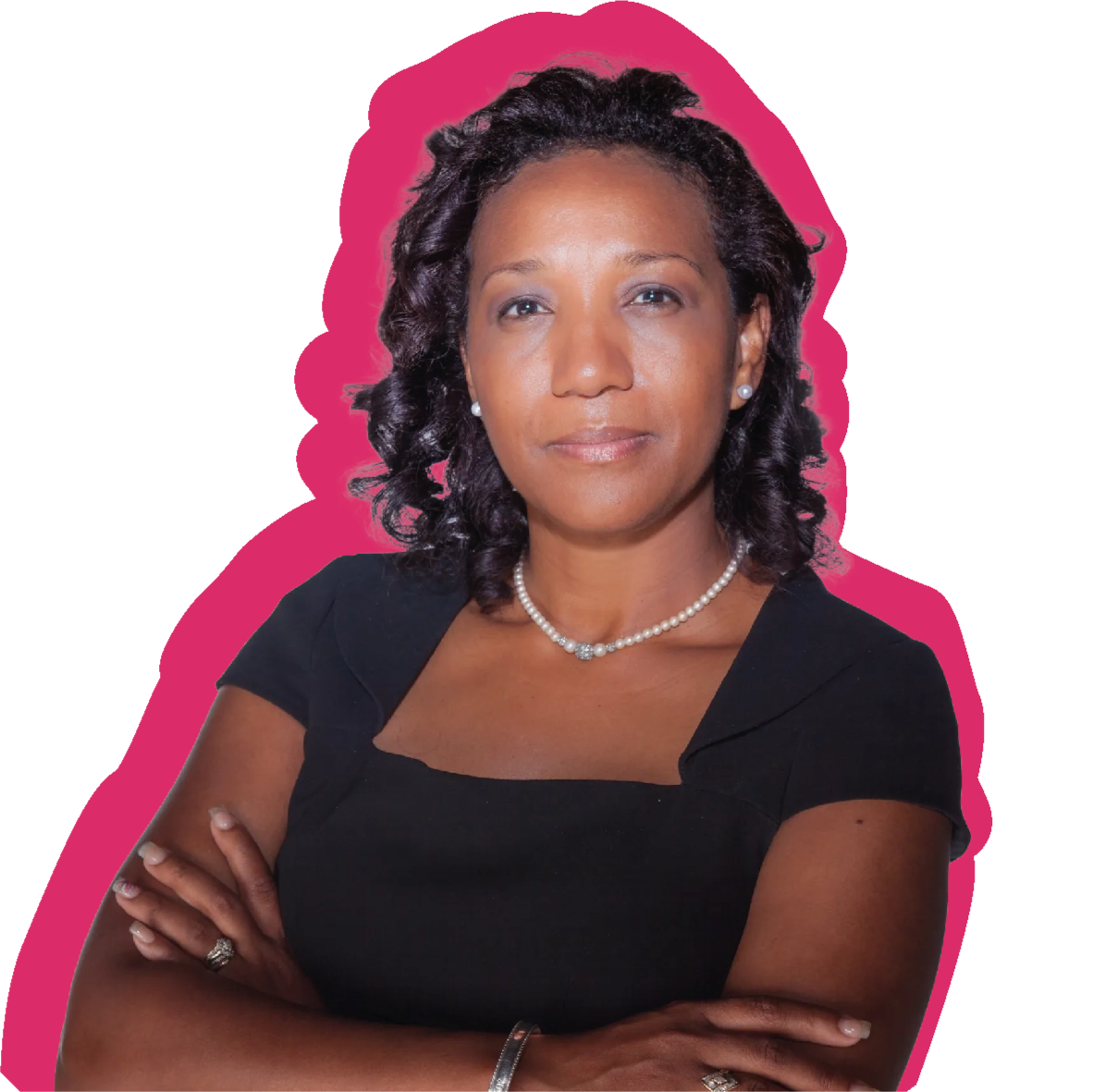
“Do your research, build trust, build understanding, build empathy to let folks know that, “Yes, I cannot walk in your shoes, but if I take mine off and put your shoes on, I can feel what you feel.”
—Sophia Chue, Caribbean Community Service Center
“Language barriers are always a factor in services. At HDC we offered forms in Spanish when available since that is the 2nd most common language in our apartment communities.”
—Jennifer Santiago, HDC MidAtlantic
“They are not familiar with this process and even think their vote doesn’t count. It’s not powerful, no impact—but that’s not true. So our staff very patiently explains to them why it is important, and what it means.”
—Peggy Du, Association of Chinese Americans
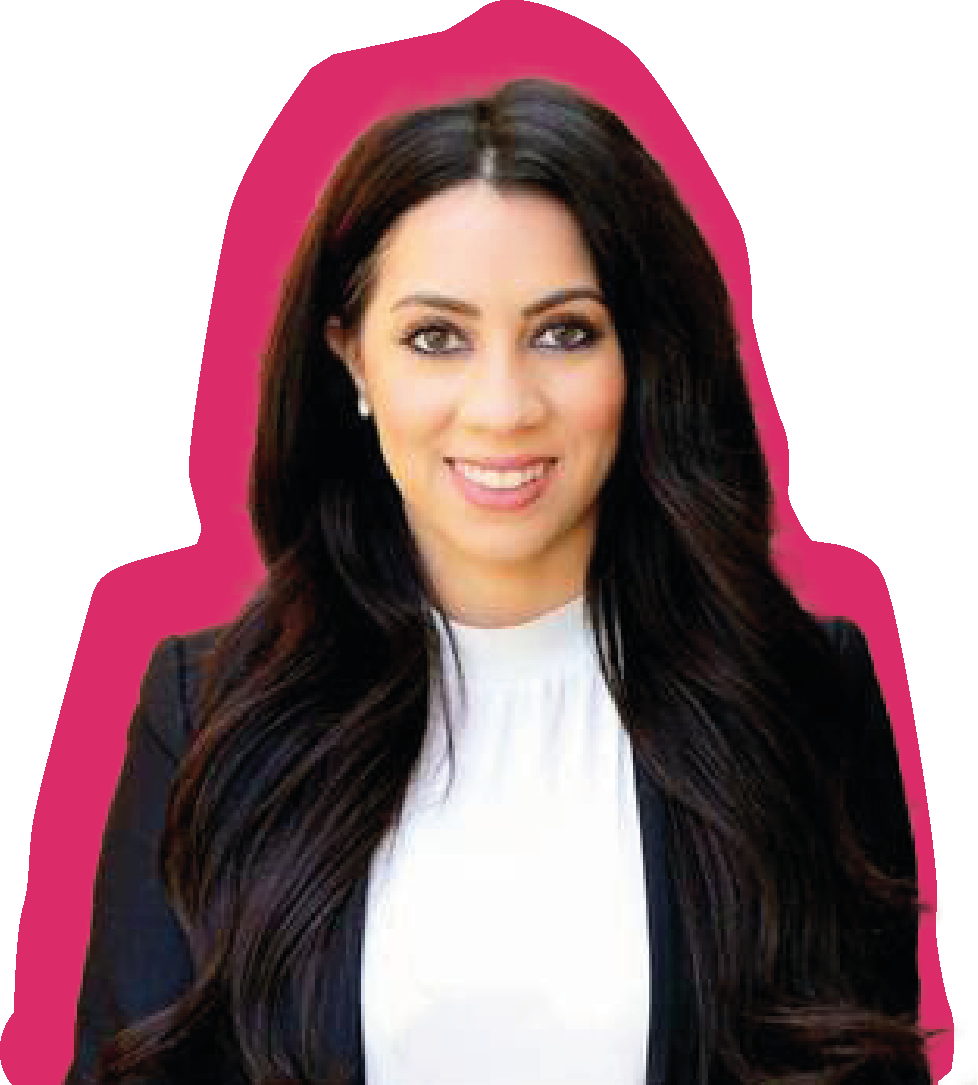
“We offer instruction and preparation for the U.S. Citizenship and Immigration Services (USCIS) naturalization interview, through a 10-week U.S. Naturalization Course. Once an individual obtains U.S. Citizenship, we will assist them through the voter registration process.”
—Stacy Bahri, Chaldean Community Foundation
“The conversation will start like, ‘do you know if you are an eligible voter or have registered for voting yet?’ We’ll still give them the registration form to show their friends who are trying to become voters, they can come to our center, we can help them with the in-language service and we can help them with the whole process and explain if they have any questions. The conversation doesn’t end when we know someone is not eligible.”
—Peggy Du, Association of Chinese Americans
“Citizenship and voting ties back into the children that we’re raising, right? So even if you are talking to folks that can never become citizens, they can still engage and encourage others to become citizens to vote.”
—Sophia Chue, Caribbean Community Service Center
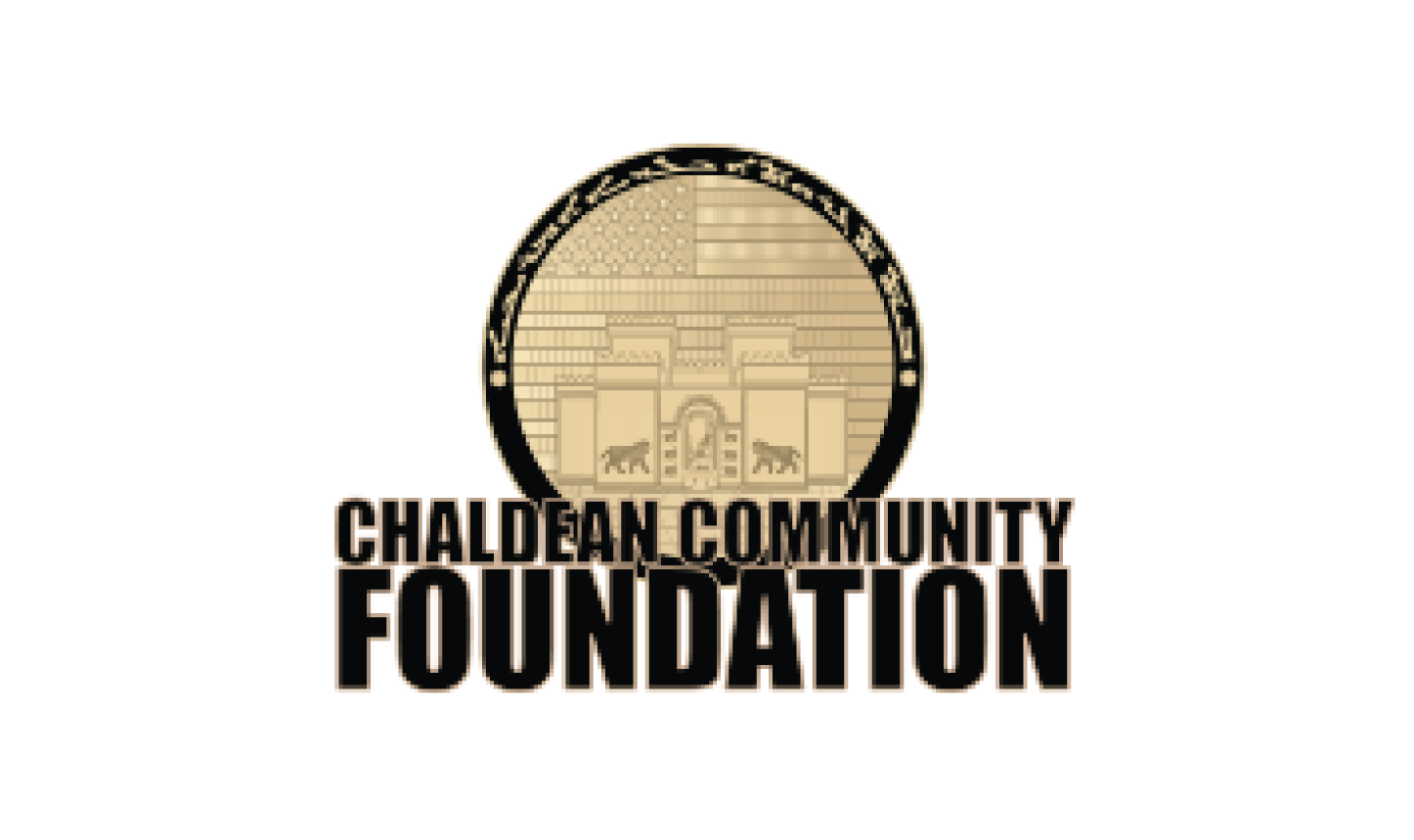
The Chaldean Community Foundation (CCF) is a 501(c)(3) nonprofit organization located in Southeast Michigan that serves new American families including refugees and immigrants that live in Michigan. In 2022, the CCF served nearly 40,000 individuals from 48 different countries of origin. The programs at the Chaldean Community Foundation provide social, educational, and family development opportunities to the many individuals seeking service. Case Work, Advocacy, Career Services, Workforce Development, and Client-Centered Planning for long-term success and self-sufficiency are key to our work and that success. Chaldeans are Eastern-rite Catholic people indigenous to Iraq and their history spans over 5,500 years.
Stacy Bahri, Strategic Initiatives Manager, answered a few questions for us.
It is important to engage Chaldean voters to get out and vote on issues that matter to them and their family and participate in the decisions that shape the future of our community. Michigan is home to 160,000+ Chaldeans mainly residing in Macomb and Oakland Counties. We understand the importance of having representation and a voice in the community. Our hope is that in the future we will have more community members become politically involved and hold elected positions.
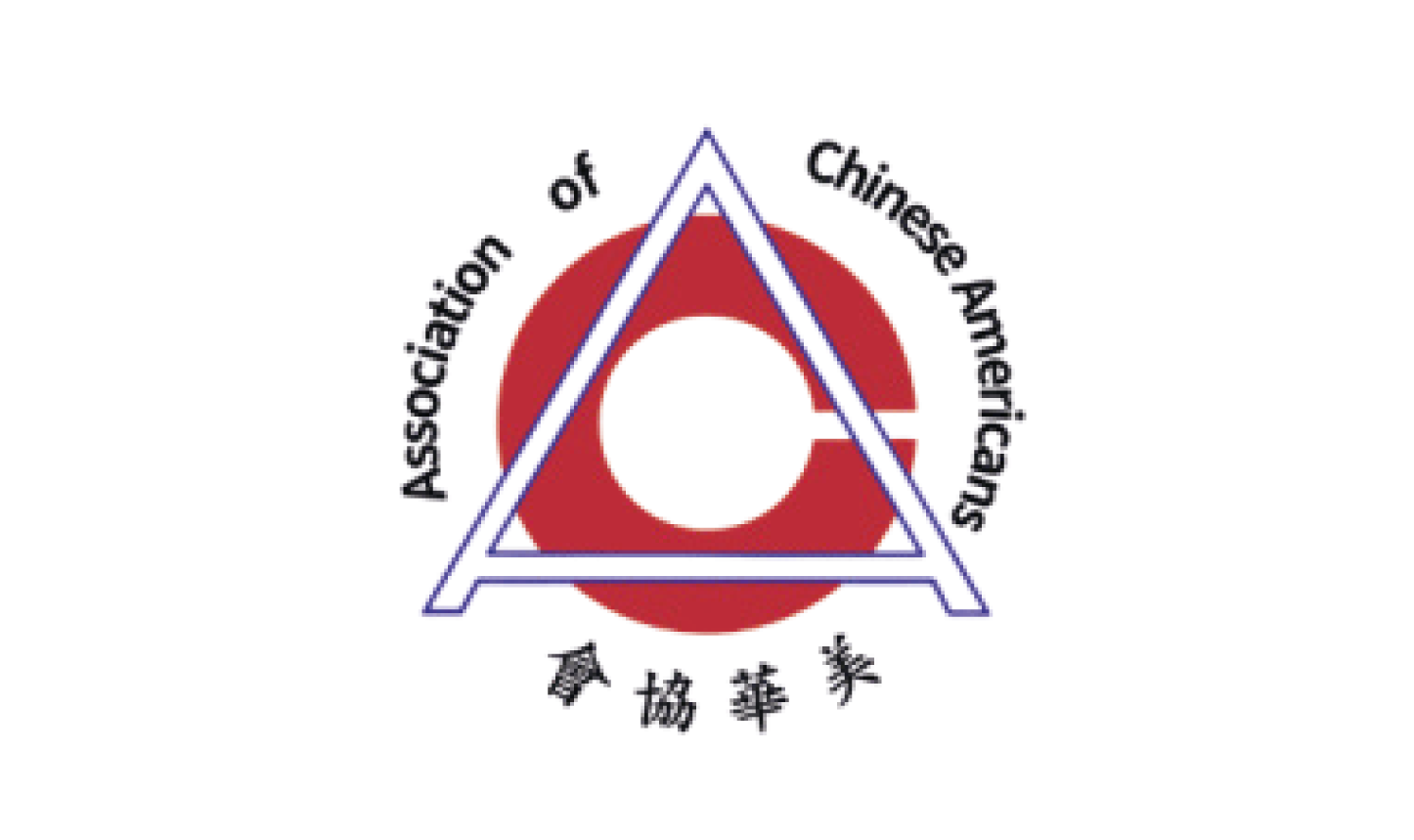
The Association of Chinese Americans (ACA) has served the Metro Detroit community for more than 50 years. Through its three service centers and year-round programming focused on youth, seniors, and low-income individuals and families, ACA reaches over 5,000 people each year. Their mission is to promote and enhance community health, security, and cultural awareness while advancing the social, educational, political, and economic well-being of Asian-Pacific Americans in the United States
We spoke with Peggy Du, Executive Director, and Emma Yin, Program Manager, about their voter outreach efforts.
Peggy: We are a grassroots organization, so here we provide a daily service and we help Asian American people to register to vote and explain that our voice being heard is very important. We were locally established in 1972. That means we’ve been serving the community for more than 50 years. It makes us a very trustworthy organization. So people think of this like their second home.
Emma: We have social workers for daily service and also we have some special events, like last year we had a Healthy Gardening Fair with 500 people, and we have a golf outing, a summer camp, school field trips, and the annual gala. During every special event, we will put our voter pledge card on the information display, and for the registration table we have an employee available to explain and talk to the client or participant.
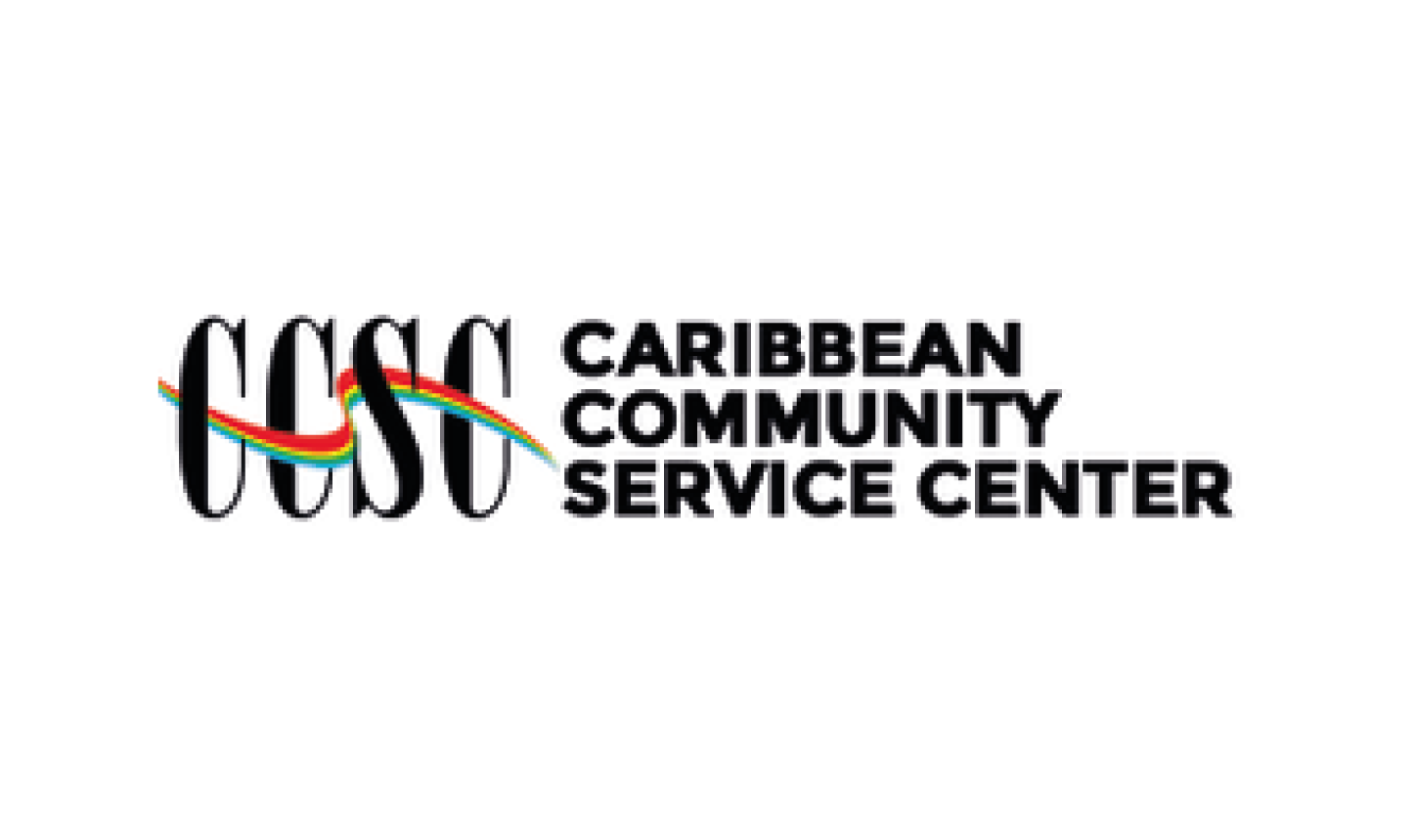
The Caribbean Community Service Center supports, empowers, and advocates for a beneficial, welcoming, and inclusive environment to Caribbean nationals as they adapt to life in the United States. By fostering strategic alliances with similar organizations, Caribbean Community Service Center works to provide programs to connect community members to services, professional development opportunities, sports, arts, cultural development, and community advocacy in hopes of helping to build individual social and economic resiliency. More than 19,000 Caribbean people currently live in Michigan, coming from 32 different countries with shared cultural traits.
We spoke Sophia Chue, founder of Caribbean Community Service Center.
I started pushing for voting in our community in 2014. We’re using different strategies because we have to pivot as our community pivots, right? I make sure that I’m out there learning, bringing the information in. There is a lack of knowledge. Our community silos ourselves and we’re not as engaged in finding out about elected officials because we don’t think our voice matters. Until myself and a couple other community members started actually bringing elected officials or folks that were running into our space, nobody really paid attention to us.
Coming Soon! Look out for an interview with Jennifer Santiago of HDC Midatlantic.
Key Findings About U.S. Immigrants
pewresearch.org/short-reads/2020/08/20/key-findings-about-u-s-immigrants/
Naturalized Citizens Make Up Record One-in-Ten U.S. Eligible Voters in 2020
pewresearch.org/hispanic/2020/02/26/naturalized-citizens-make-up-record-one-in-ten-u-s-eligible-voters-in-2020
Harvard Immigration Initiative
immigrationinitiative.harvard.edu/topic/first-and-second-generation/
Help spread the word about the most effective ways to engage voters in immigrant communities using our shareable content for Twitter, Facebook, and Instagram below. (Right-click the images for the option to save.)
DON’T FORGET TO TAG US ON SOCIAL:
Featuring accounts from nonprofits in the field, the second installment of Nonprofit VOTE’s (@npvote) Nonprofit Power Report uplifts nonprofits working to engage voters from immigrant communities, and highlights key voter engagement strategies! Learn more: nonprofitvote.org/nonprofit-power
